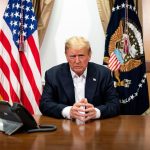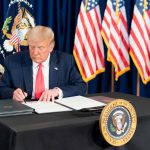Stephen Miller, known for his straightforward and often provocative commentary, recently made waves by asserting that President Trump’s tariffs represent a pivotal moment in safeguarding America’s economy. During an appearance on “Sunday Morning Futures,” Miller posited that these tariffs are not merely economic measures; they are a robust response to what he describes as an impending threat of economic domination by China. He humorously engaged with the gravity of the situation, suggesting that history would inevitably credit Trump’s administration for taking decisive actions that are crucial for the West’s survival.
Miller, undeterred by the flak that often follows bold statements, articulated that it is outright shameful for the United States to have allowed essential elements of its supply chains to be situated in China. He argued that this dependency gives China an unsettling degree of control over global economics, calling such a situation unthinkable for a nation proud of its sovereignty. The notion of America being at the mercy of another country, particularly one that has engaged in various unethical economic practices, is more than just a talking point; it strikes at the very core of national security.
Deputy Chief of Staff @StephenM: "History will record that the actions @POTUS has taken in recent days were the beginning of saving the West from complete economic domination by another power." 🔥 pic.twitter.com/eMapEnNSxQ
— Rapid Response 47 (@RapidResponse47) April 13, 2025
As he continued, Miller emphasized the extraordinary lengths China has gone to manipulate the global trading landscape. He highlighted a slew of tactics employed by the Chinese government, including intellectual property theft, industrial espionage, and currency manipulation that have ultimately skewed the trade system in their favor. The argument is clear—China’s unchecked practices have led to a dire need for redress, and Miller insists that Trump’s tariffs are a long overdue counteraction to these abuses. It’s not just business as usual; it’s a battle for American interests that Miller believes all previous administrations failed to adequately address.
In the midst of heightened market volatility surrounding the tariffs and changes in trade policy, Miller maintained a sense of optimism. As stocks appeared to rally ahead of the trading week, he suggested that the economic discomfort that may accompany these tariffs will pay off in the long run. His confidence reflects a broader sentiment among conservative analysts who see the tariffs as a necessary course correction against decades of detrimental trade policies that have favored foreign nations over American industries.
Ultimately, Miller’s assessment serves as a rallying cry for conservatives who see these tariffs not just as economic tactics, but as a means of reclaiming autonomy on the global stage. For those who have been concerned about the implications of outsourcing and China’s aggressive economic policies, Miller’s words offer both clarity and encouragement. The message is loud and clear: the time has come to stand firm against international economic practices that threaten American prosperity.




